2023 Chrysler 300 Review and Test Drive
Goodbye, budget Bentley. It's been a blast.
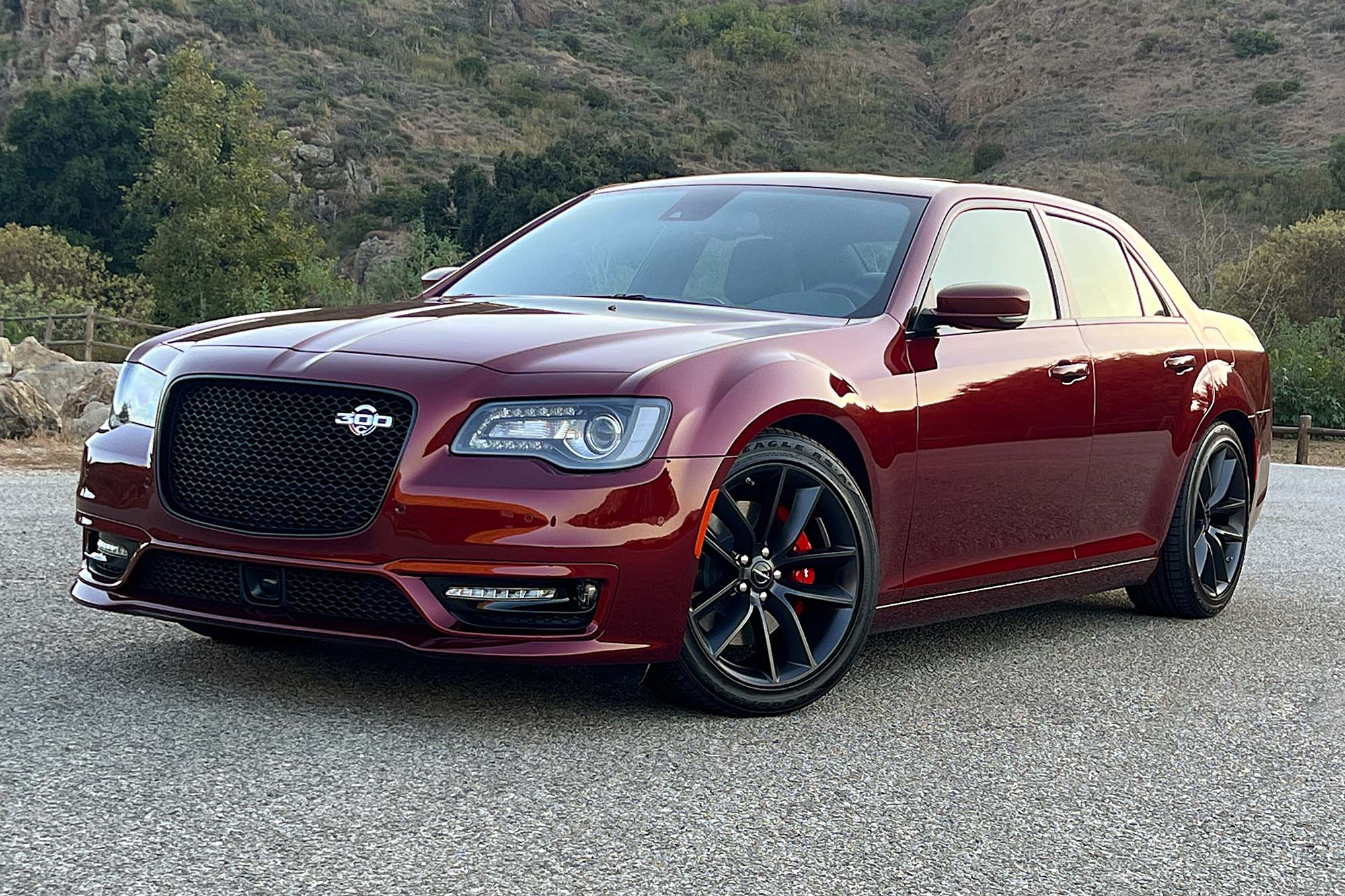 Christian Wardlaw
Christian Wardlaw
Driving the 2023 Chrysler 300C is bittersweet. For this iconic car's final production year, Chrysler returned big power under the hood, meaning that a rousing and raucous drive of the 300C special edition feels like quitting a vice. You know it will be good for you to stop — but you'll miss it. So you revel in one last punch of the accelerator, slip of the tires, and roar of the exhaust.
The last time you could buy a new Chrysler 300 with a 6.4-liter Hemi V8 engine was in 2014. The engine returns this year, but only in the 2,000 examples of the 2023 300C Chrysler will build to mark almost 70 years of the 300 nameplate. The first 300 debuted in 1955, and this final iteration closes out current 300 production with a mighty flex of 485 horsepower.
There's more than just a big engine to the 300C. Chrysler fortifies it with upgraded brakes, an active performance exhaust system, an active damping suspension, and 20-inch forged aluminum wheels wrapped in 245/45ZR20 Goodyear Eagle RS-A tires. Chrysler also loads up the 300C with features, including premium leather, carbon-fiber trim, a panoramic sunroof, and a Harman Kardon surround-sound system.
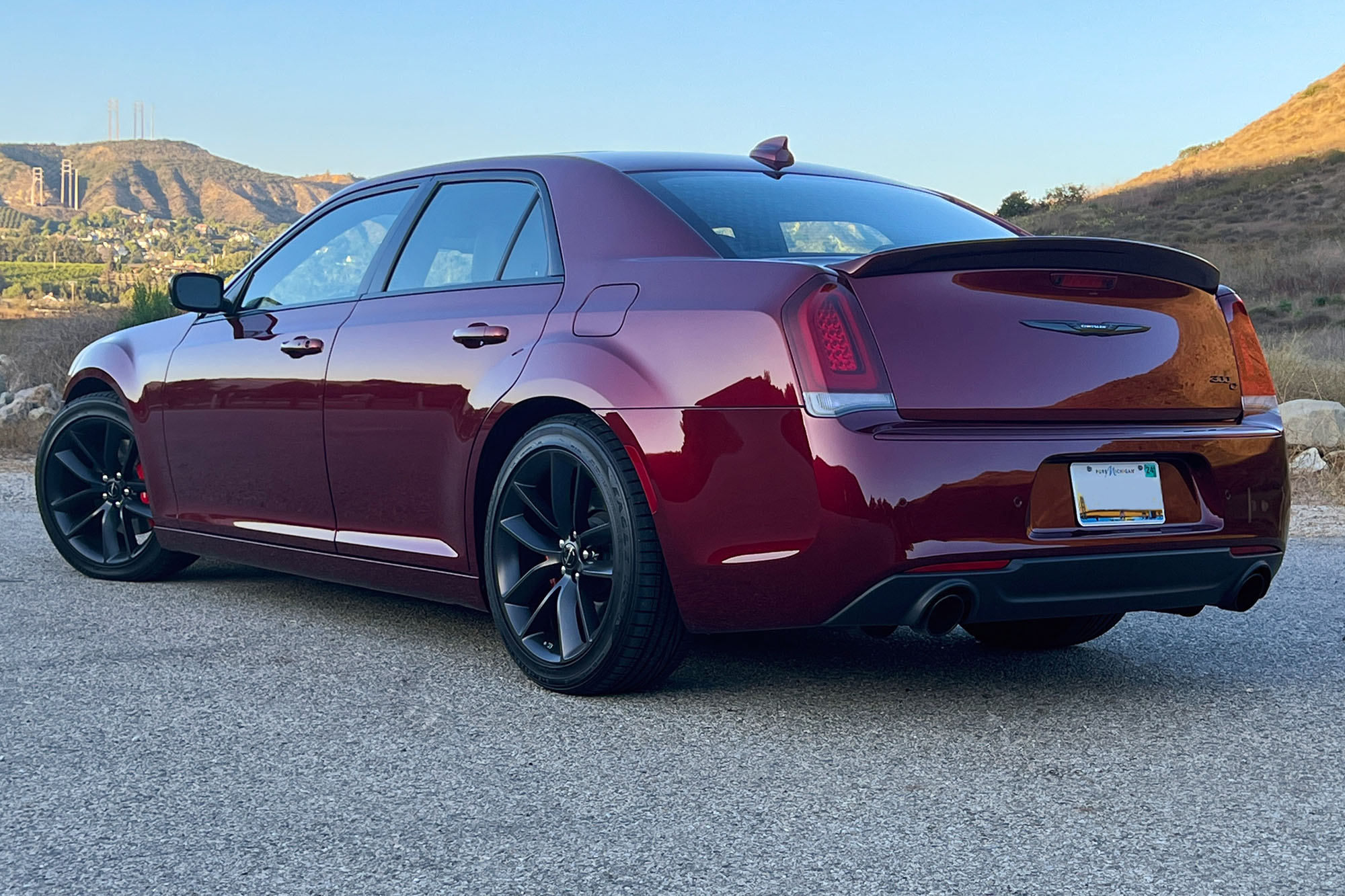 Christian Wardlaw
Christian Wardlaw
2023 Chrysler 300 Prices: Upscale Swagger, Accessible Value
There are other 2023 Chrysler 300 models from which to choose. In addition to the 300C, the car comes in Touring, Touring L, and 300S trim levels. Base prices range from the mid-$30,000s to the mid-$50,000s, including the destination charge to ship the car from the Brampton, Ontario, factory that builds it to your local dealership.
For this Chrysler 300 review, I test-drove the 300C in Southern California. It came fully loaded without any options and wore a manufacturer's suggested retail price of $56,595, including the $1,595 destination charge. Chrysler provided the vehicle for this 300C review.
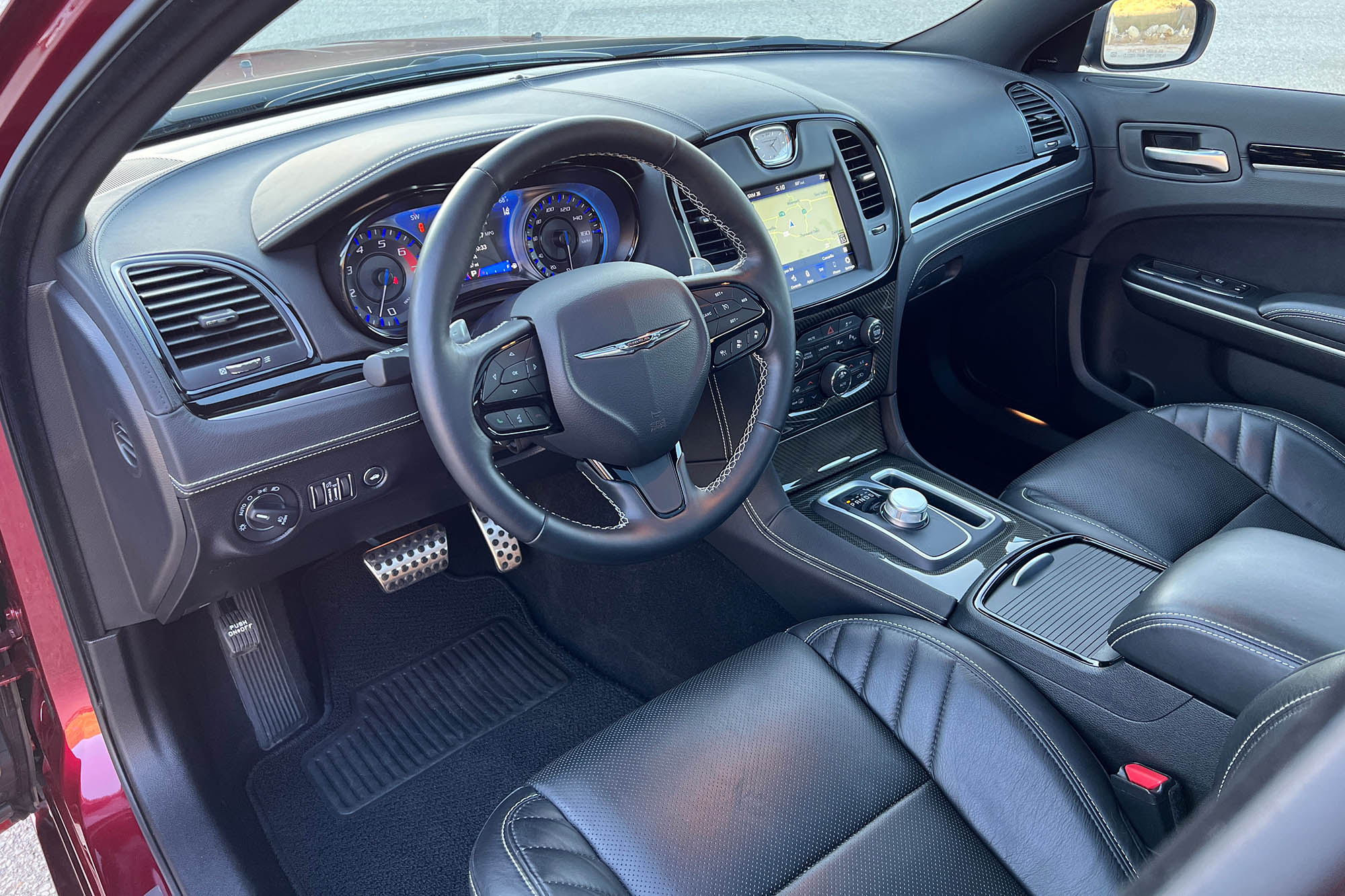 Christian Wardlaw
Christian Wardlaw
Chrysler's Budget-Priced Bentley Has Aged Gracefully
The current Chrysler 300's styling dates to 2011, when the company last overhauled the model. However, the underlying platform, vehicle architecture, and some components are even older, going all the way back to 2005. If you welcomed a baby into your family when the modern 300 first went on sale, they're likely graduating from high school now.
Somehow, the 300 defies its age, like an automotive equivalent of Tom Cruise or George Clooney. The car's elegant proportions still look good today, with yesteryear lighting elements the main giveaway that this Chrysler isn't a new retro-styled sedan.
Inside, though, I think the 300 shows plenty of gray hair and wrinkles. Blissfully, the only touch-sensing thing in the car is the 8.4-inch infotainment screen. But aside from a modern-looking digital driver-information display between two analog gauges I found nearly illegible, the 300 feels as technologically advanced as an iPod.
Buttons, knobs, and switches are everywhere, so using the Chrysler 300's controls is easy and intuitive. Some people might dislike the rotary transmission shifter knob, but there isn't much confusion about how things work. Unfortunately, while the 300 looks like a luxury car, I don't think it feels like one. Aside from the 300C test vehicle's premium Laguna leather upholstery and smatterings of contrast stitching, I found the material quality merely acceptable.
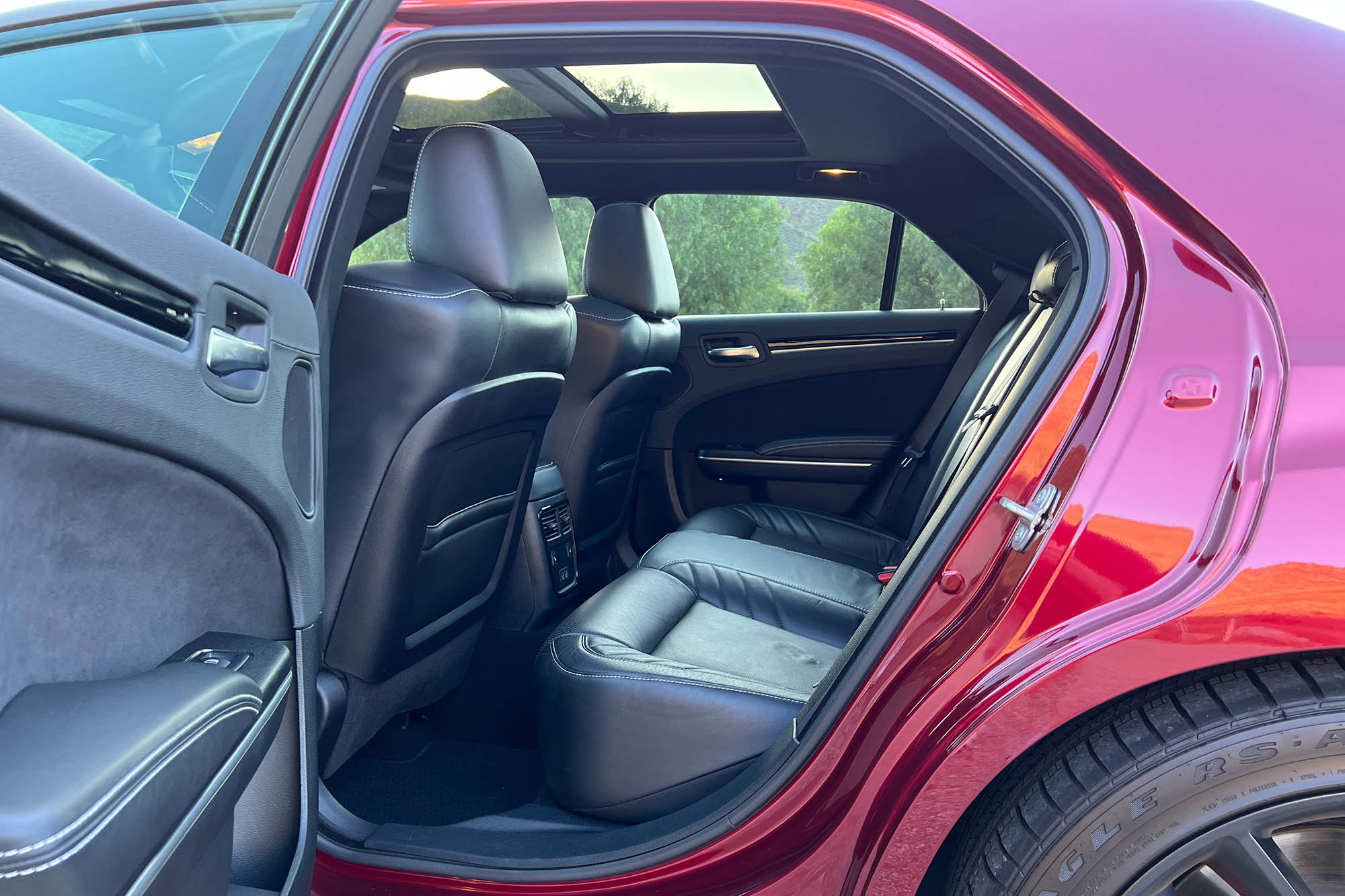 Christian Wardlaw
Christian Wardlaw
Compromised Comfort
Chrysler equips the 300C with power-adjustable heated and ventilated front seats wrapped in the company's highest-quality Laguna leather upholstery. They feature large but not stiff bolsters and adjustable lumbar support to ensure comfort. In addition, the 300C includes a heated, power-adjustable steering wheel.
Unfortunately, with the panoramic sunroof and the 300's already low roof, I had to position the driver's seat lower than I preferred, producing a sensation of limited outward visibility. Worse, the spoiler on the trunk lid, the thick rear roof pillars, and a reversing camera with a low-resolution picture make it hard for me to maneuver the 300. Chrysler doesn't offer a surround-view camera, either, which would help.
The back seat isn't as roomy as you might expect. The Chrysler 300 is considered a full-size car, but to me, the back seats feel about as spacious as those of a modern Honda Civic. Worse, Chrysler panels the front seatbacks in plastic, which is unkind to knees and shins. I'm also not a fan of the slightly reclined rear seatback, either, which makes me feel like I'm slouching in the seat.
However, with the 300C's heated outboard cushions, decent leg support, rear air-conditioning vents, and USB charging ports, I think shorter people will find this sedan to be agreeable enough in the back.
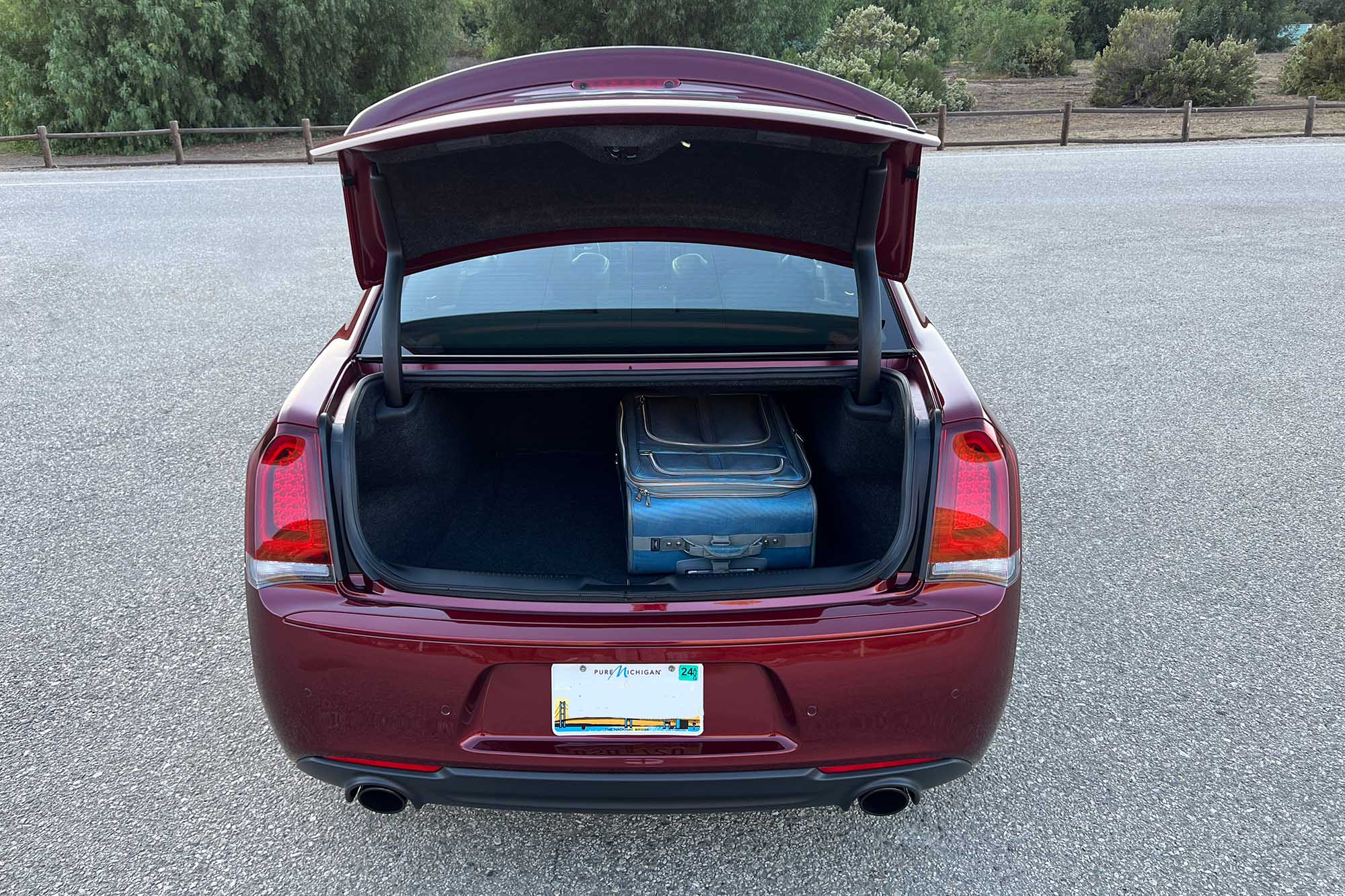 Christian Wardlaw
Christian Wardlaw
Stingy Storage, Commodious Cargo Space
Aside from a large glove compartment and a sizable bin underneath the front center armrest, storage space is modest. Inconveniently, the front USB ports and a 12-volt electrical socket are in the center console, and the 300 doesn't offer a wireless smartphone charger. The oddly dished tray forward of the shift knob doesn't secure a modern smartphone, either. However, the test vehicle's front cupholders offered heating and cooling, which is unusual.
Pop the trunk lid using the button on the lower dashboard or the remote keyless entry fob, and the lid opens wide to accept up to 16.3 cubic-feet of cargo. A 60/40-split folding rear seat allows the car to accommodate longer items when necessary. The test vehicle also had a small storage area underneath the trunk's load floor, and a handle within the lid helps you to swing it shut without touching the exterior.
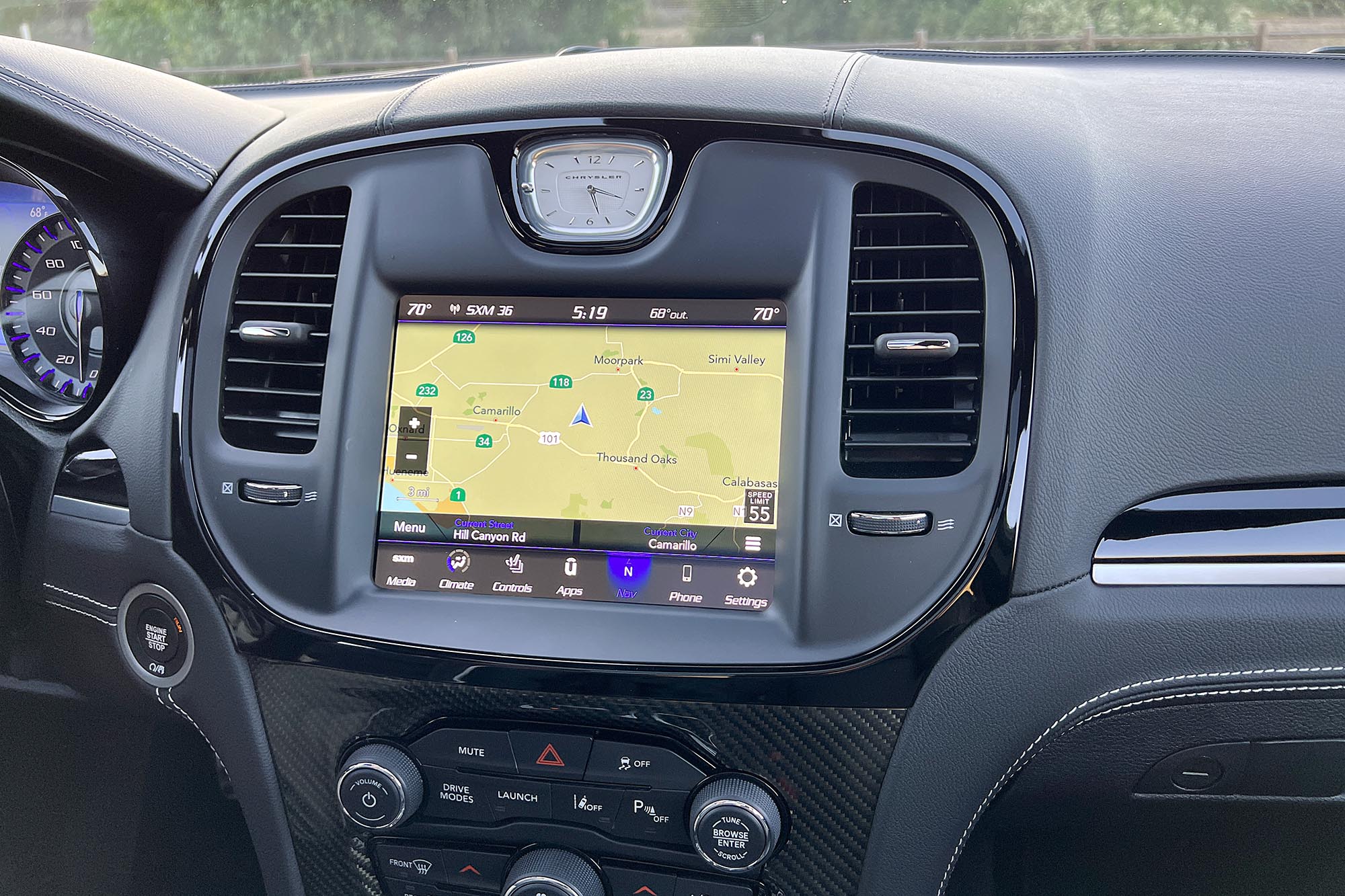 Christian Wardlaw
Christian Wardlaw
2023 Chrysler 300 Uconnect Review: An Oldie but a Goodie
The Chrysler 300's Uconnect 8.4-inch touchscreen infotainment system is older technology. But the interface is intuitive and includes popular features such as Bluetooth connectivity, Apple CarPlay and Android Auto compatibility, SiriusXM satellite radio, voice-recognition, and a Wi-Fi hot spot. My 300C test also had a 19-speaker Harman Kardon premium surround-sound system, which I found produced excessive bass with the standard settings.
Though the Uconnect system's display may feel small by modern standards, it remains a model of simplicity. Virtual main-menu buttons line the bottom of the screen, and the Chrysler 300's overall lack of technology makes it easy to find what you seek and to configure settings. Unfortunately, to use the front-seat heating and ventilation or the heated steering wheel, you must use the screen, which is a hassle.
Another tell revealing the 300's age is that the graphics could be more sophisticated, especially the navigation map. But, I found the voice-recognition system better than what you might find in some vehicles. Using the evaluation prompts I administer in every test vehicle, Chrysler's system adequately responded or came close enough to rate as satisfactory, if imperfect.
Though Chrysler provides large stereo volume and radio tuning knobs on the dashboard, I preferred using the hidden controls on the back of the steering wheel spokes. On the left, you can tune station by station or skip through your saved favorite stations. On the right, you can adjust the volume and mute the stereo. With practice, using them becomes second nature.
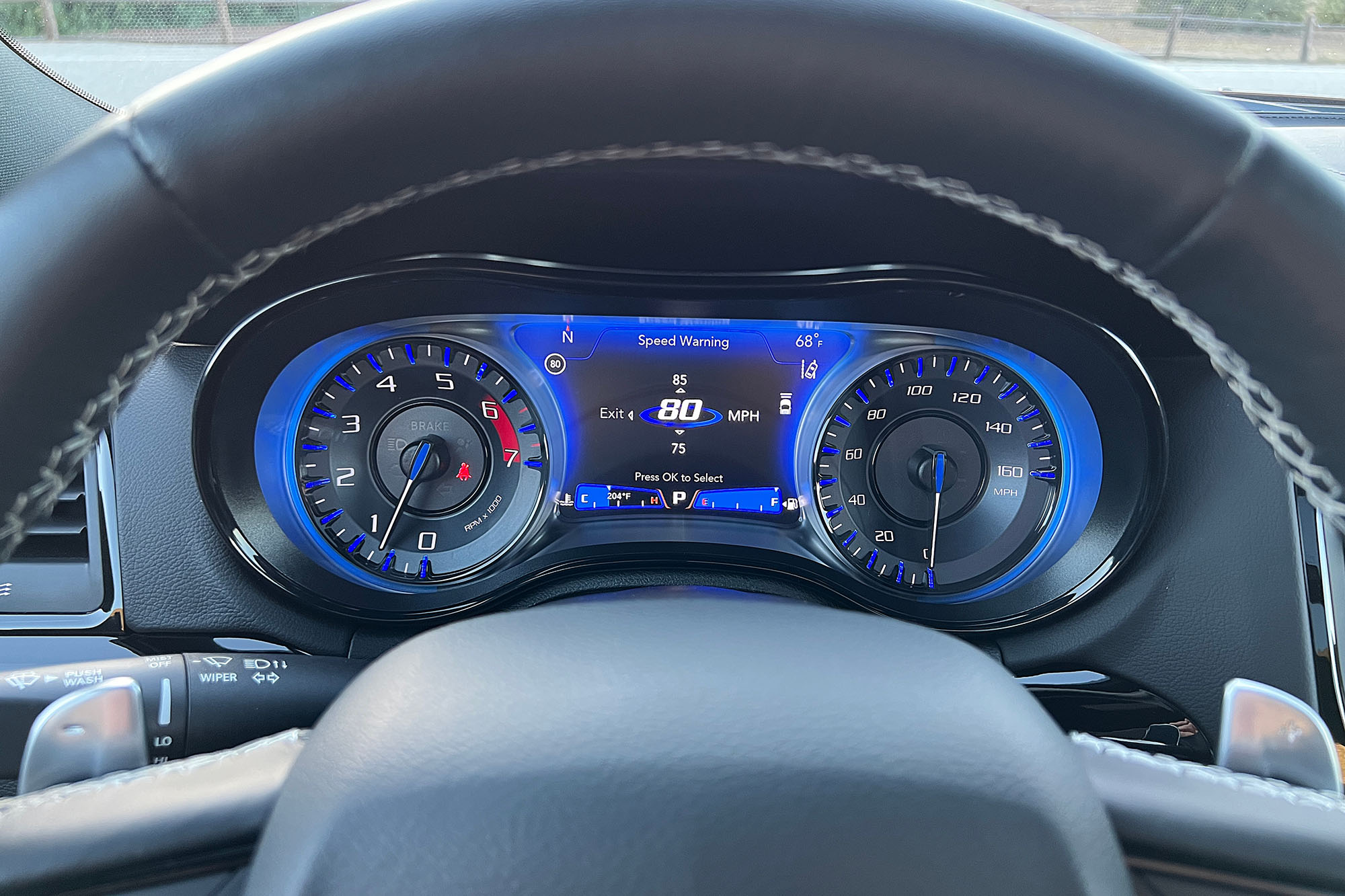 Christian Wardlaw
Christian Wardlaw
Tech for Monitoring Performance
Press the Drive Modes button on the dashboard or choose the Apps menu from the Uconnect touchscreen, and you'll find your way to a Performance Pages menu. Here, you can configure the 300C's behavior and track performance-related data such as acceleration time, g-forces, mechanical status, and so forth. Much of this data is also available in the digital driver-information display within the instrumentation.
Considering Chrysler claims the 300C can reach a top speed of 160 mph, it's unsurprising that there's a speed warning system. I programmed it to alert me each time I exceeded 80 mph but discovered the 300C's engine, exhaust, road, and wind noise make it hard to hear the warning. Unless you catch a glimpse of the visual alert on the display, the feature could prove unhelpful in avoiding a speeding ticket.
While the 300C's lack of technology is somewhat appealing, I think this car desperately needs a surround-view camera system. However, since the 300 is going out of production, that's not in the product plan. Nothing is.
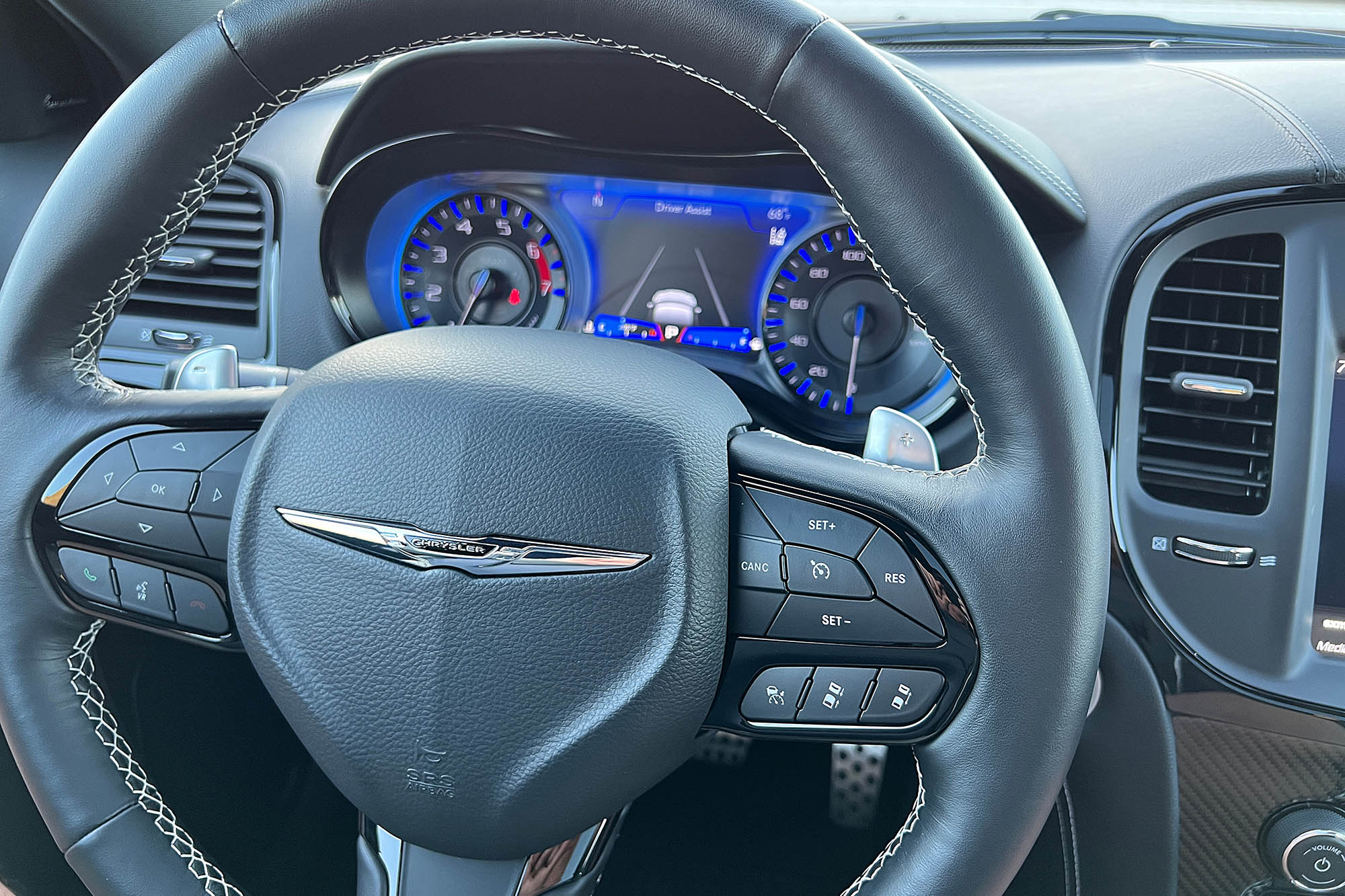 Christian Wardlaw
Christian Wardlaw
2023 Chrysler 300 Safety Tec Plus: Back to Basics
As with Uconnect, the Chrysler 300's collection of advanced driving-assistance systems (ADAS) is relatively rudimentary, though simple and useful. However, now that the Safety Tec Plus Group is available on the base Touring trim, most of the available features are optional on all but the 300C, which has them as standard equipment.
Depending on the trim level, the Safety Tec Plus Group includes adaptive cruise control with full-stop capability, forward-collision warning, automated emergency braking, blind-spot monitoring, rear cross-traffic alert, lane-departure warning, and lane-keeping assist.
Note the absence of a Level 2 driving-assistance technology pairing adaptive cruise control with lane-centering assist. The omission is acceptable, especially if you don't want the technology, but it represents yet another indication of the Chrysler 300's age.
It also means my evaluation of Safety Tec Plus is light on complaints.
I found the adaptive cruise control adept at maintaining a safe distance from traffic ahead. However, when other motorists cut into the gap in front of the car, the Chrysler can brake too much and for too long, followed by a slow resumption of cruising speed.
On a positive note, I liked the lane-keeping assist system. When programmed to medium sensitivity and response, it proved accurate and effective without adding sudden, aggressive inputs. That said, I think the lane-departure warning system could be more helpful, as it lacks a steering wheel vibration signal or an audible chime, leaving you only with a visual indicator shown within the instrumentation.
According to the National Highway Traffic Safety Administration, the 2023 Chrysler 300 earns an overall safety rating of four stars out of five. That's not unusual, but it's worth noting the least safe seating position in the car is the driver's seat.
The Insurance Institute for Highway Safety has not performed any of its latest tests on the Chrysler 300. However, existing test scores show Marginal protection in a small overlap frontal impact on the driver's side and a Poor rating for headlight illumination.
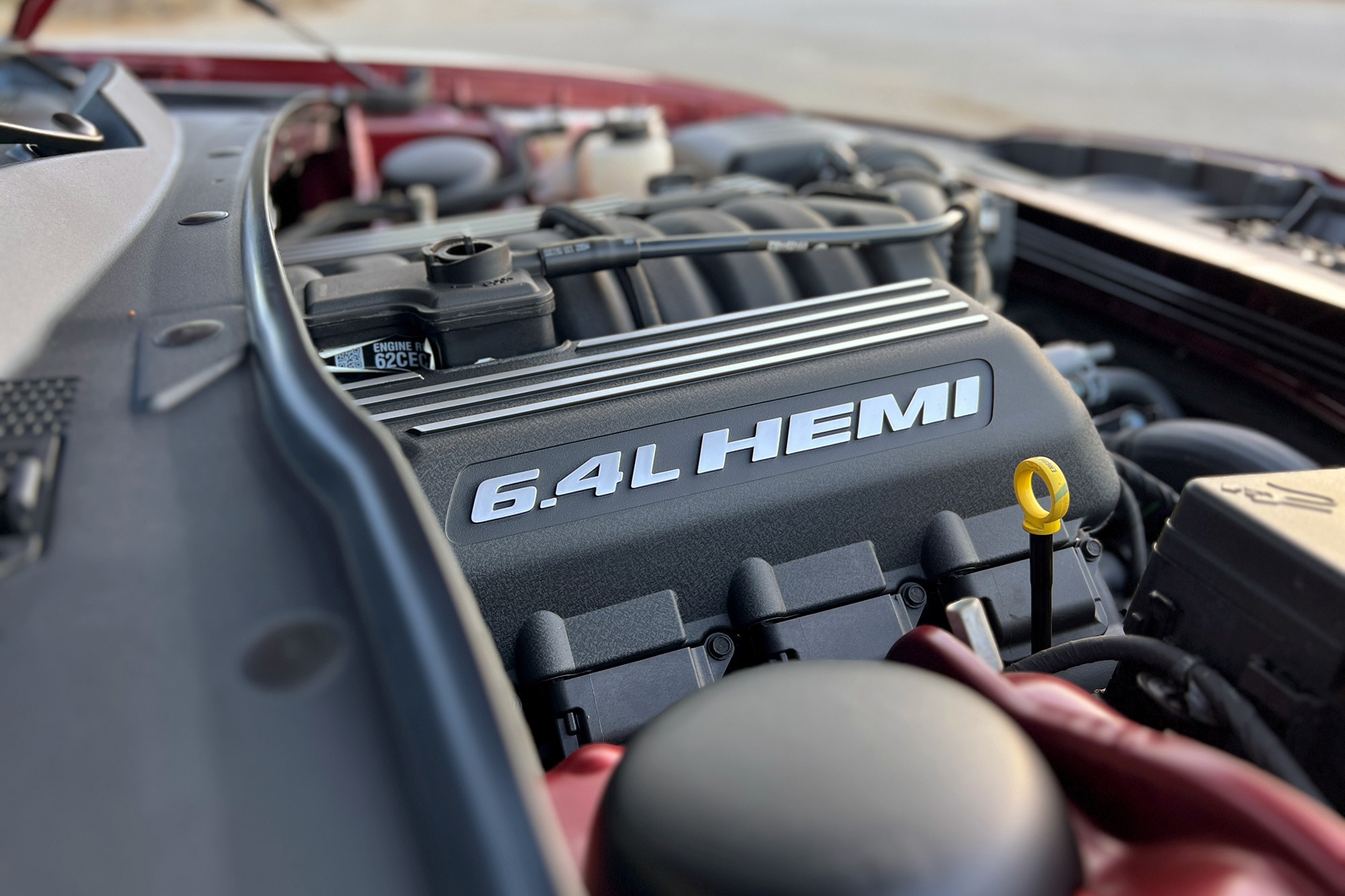 Christian Wardlaw
Christian Wardlaw
The 6.4-liter Hemi V8 Is Back, for a Limited Time Only
Most Chrysler 300s have a 3.6-liter V6 engine making around 300 horsepower. This engine pairs with an eight-speed automatic transmission and rear-wheel or all-wheel drive. My experience driving this car with the V6 engine demonstrates it provides a decent blend of acceleration and efficiency.
Still, some people can't live without the deep rumble of a V8 engine. Available in the Chrysler 300S, a 5.7-liter Hemi V8 supplies that satisfying sound accompanied by 363 horsepower and 394 pound-feet of torque. This engine powers the rear wheels through an eight-speed automatic.
My limited-production 300C test vehicle had a 6.4-liter Hemi V8 producing 485 horsepower and 475 lb-ft of torque. Like the 300S V8, the 300C uses an eight-speed automatic to spin — I mean, power — the rear wheels. According to Chrysler, the 300C accelerates to 60 mph in 4.3 seconds, screams to a 12.4-second quarter-mile time, and rockets to a top speed of 160 mph.
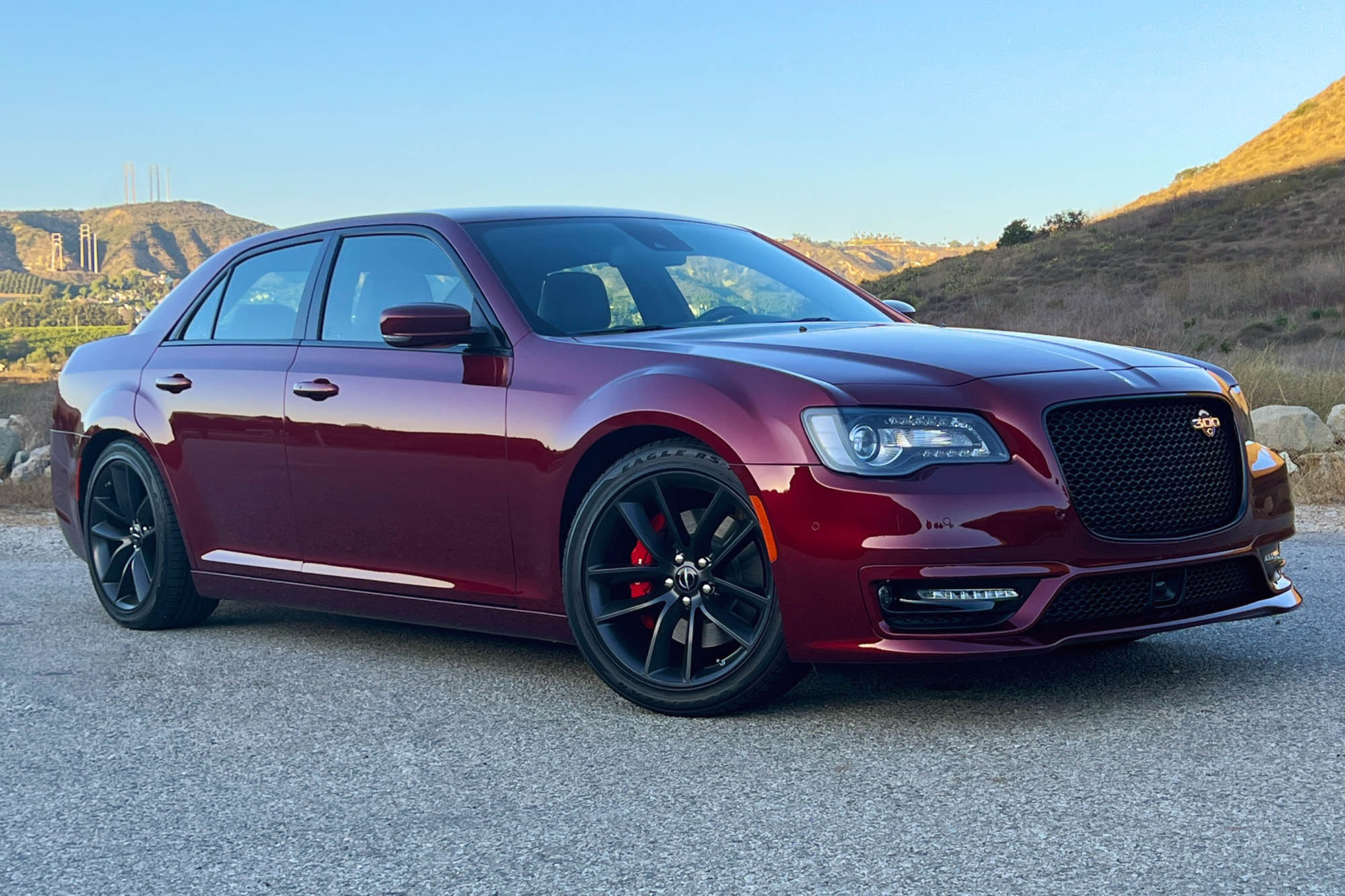 Christian Wardlaw
Christian Wardlaw
Driving the Chrysler 300C: On the Edge of Control
To achieve those feats of strength, you'll want to activate the car's launch control system. While I didn't try it out, I assume it tames the 300C's tendency to break the rear tires loose and helps put the 6.4-liter Hemi's power down in the most effective way possible.
As for the 160-mph top-speed claim, well, someone with more courage than I drove the 300C to ascertain that velocity. During my testing, I found the car's vague steering and suspension float dented my confidence at double-digit speedometer readings. This powerful Chrysler feels just on the edge of control much of the time.
Granted, I drove the 300C almost exclusively in its Auto driving mode with all settings tuned to Street instead of Sport. While threading down Mulholland Highway in the Santa Monica Mountains near Malibu, I switched to Sport mode, which sharpened the powertrain response while tightening the car up and adding plenty of heft to the steering. But then I noticed the stability-control warning light within the instrumentation. Given how easily you can spin the Goodyears without trying, I quickly switched the car back into Auto mode for maximum safety during curve and corner exits.
There is a solution for this conundrum, and it's called Custom mode. Configure the 300C's driving dynamics within the Custom menu, and you can find a satisfying mix of settings without reducing or eliminating the effectiveness of the stability-control system.
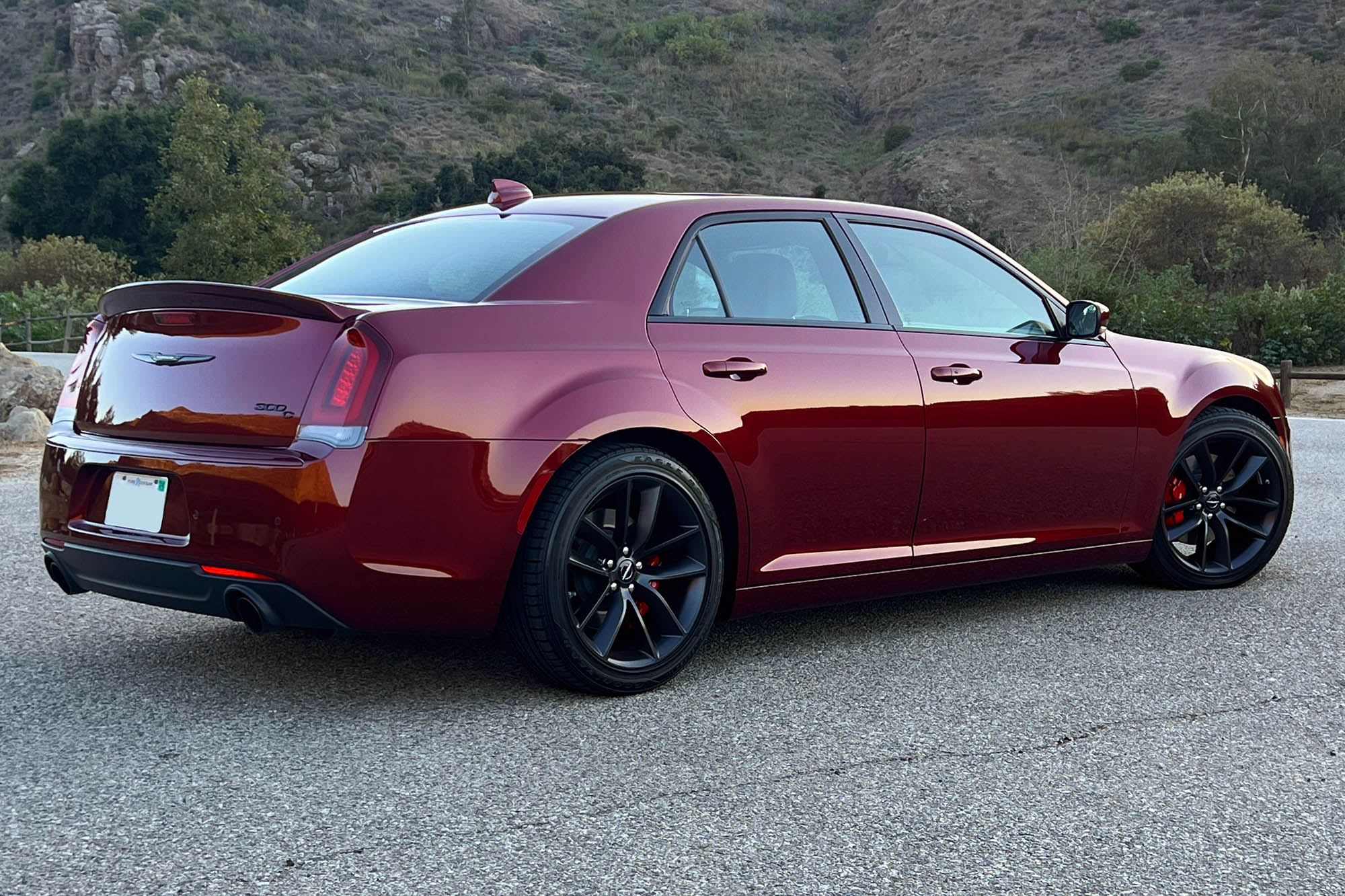 Christian Wardlaw
Christian Wardlaw
Alternatively, if you prefer to live dangerously, Chrysler gives you a button on the dashboard to shut off the traction and stability control.
Regarding daily driving, the Chrysler 300C requires a light foot on the accelerator pedal. It's easy to squeal and momentarily spin the back tires, and if you push too hard when accelerating up to freeway speeds, you may find — as I did — that the rear end can feel a little greasy. Switching to summer performance tires might lend the sedan some extra grip and stability.
In addition, the 300C has Brembo front brakes with four-piston calipers, and my experience was that they can bite with too much authority if you're not careful with pedal pressure. Of course, the benefit is impressive performance under duress, and they never produced a hint of fade while I was running the car hard in the mountains.
In Auto mode with the suspension in the Street setting, the 300C offers firm but agreeable ride quality without transferring much road shock into the cabin. The steering feels light and effortless, making it easier to park the Chrysler.
Lastly, while I adore the 300C's stealthy look, I think the active exhaust system is unnecessarily loud. When entering a local freeway, the car made so much racket that it drew the attention of a California Highway Patrol officer on a motorcycle. They shadowed me for a bit to see if my behavior would match the 300C's bellowing pipes, then exited the expressway, perhaps out of boredom.
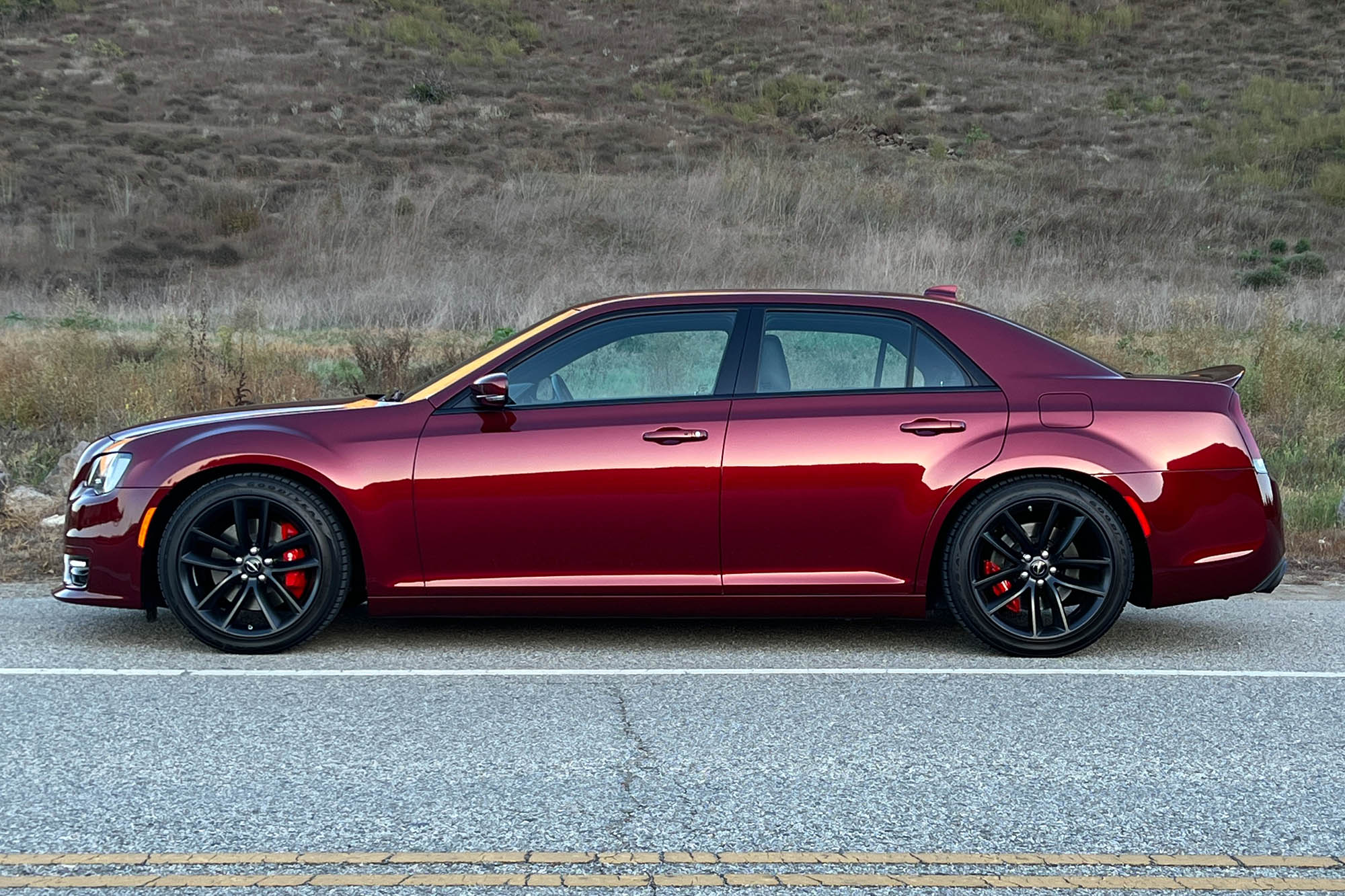 Christian Wardlaw
Christian Wardlaw
The End of an Era
Although I've rarely recommended the 300 in recent years, I still appreciate its retro flair and flavor. Aside from its corporate sibling, the Dodge Charger, there's nothing else like it, especially at the price. I will miss this car, especially in V8-powered, rear-drive specification.
Saying goodbye after this Chrysler's nearly 20-year run makes me surprisingly melancholy, especially since my final drive comes in the undeniably desirable 2023 300C special edition. The Chrysler 300 has been around for so long that it's gone from cool to caricature and back to cool again, like a 1970s Pontiac Firebird Trans Am festooned with screaming chicken decals.
Of course, it's not just the car to which we're bidding farewell. Gasoline-fueled internal-combustion V8 engines are on the endangered species list, and unless someone figures out how to make an electric vehicle rumble and roar like one, driving enthusiasm won't be the same.
Goodbye, budget Bentley. It's been a blast.
All vehicle pricing includes MSRP plus destination charges (set at the time of publication), and will be rounded to the nearest thousand.
Written by humans.
Edited by humans.
 Christian Wardlaw
Christian WardlawChris says his first word was "car." For as long as he can remember, he's been obsessed with them. The design. The engineering. The performance. And the purpose. He is a car enthusiast who loves to drive, but is most passionate about the cars, trucks, and SUVs that people actually buy. He began his career as the editor-in-chief of Edmunds.com in the 1990s, and for more than 30 years has created automotive content for CarGurus, J.D. Power, Kelley Blue Book, the New York Daily News, and others. Chris owns Speedy Daddy Media, has been contributing to Capital One Auto Navigator since 2019, and lives in California with his wife, kids, dog, and 2004 Mazdaspeed Miata.
Related articles
View more related articles